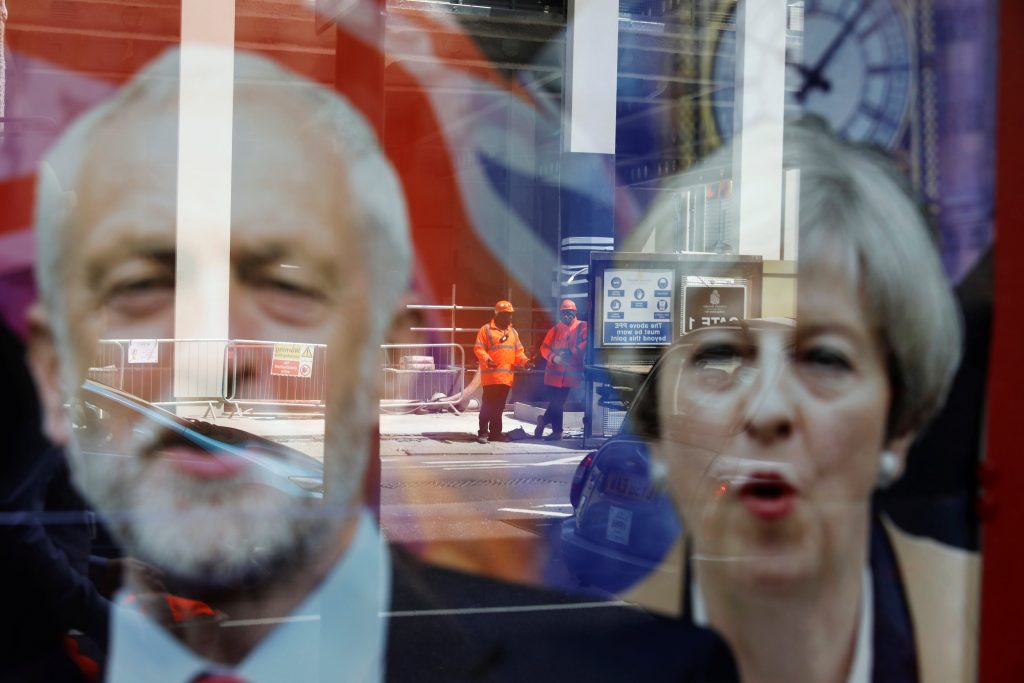Reuters photo
By
Tom Arms
They said Jeremy Corbyn was unelectable. They said he would lead the British Labour Party to electoral annihilation. They said that it would be more of a coronation than an election with a record-breaking majority for Theresa May’s Conservative Party.
But if a week is a long time in politics then the nine weeks since Mrs May called the poll is an eternity.
On the 18th of April the ruling Conservative party had a 17-seat majority and a 25-point lead in the opinion polls. It had a “bloody difficult” woman prime minister to lead the vital Brexit negotiations. They and their leader appeared “strong and stable” at a time in British history when those were the qualities most sought by the electorate.
The Opposition Labour Party appeared hopelessly divided. Changes in party election rules propelled far left Jeremy Corbyn into the leadership. But two-thirds of his parliamentary party refused to back him. There were mass resignations and sackings from the Shadow Cabinet and a failed party coup.
As I am writing this the outcome is unknown and—with debates and polls all over the place—almost impossible to predict.
So, what happened? The agenda was flipped from Brexit to welfare. The Prime Minister refused to debate. Jeremy Corbyn was revealed as still very far left but likable, and not as looney as originally thought. Mrs May was exposed as unlikeable and weak and wobbly. The British public were revealed as tired of the Conservatives’ austerity policies. And finally, a string of terrorist incidents hit Mrs May hard as Corbyn attacked her record as Home Secretary when she reduced the British police force by 21,500.
Both of the two main parties have swung to the extreme left and right of the political spectrum. The Conservatives used the opportunity of their massive early lead to push policies which would have been rejected as totally unacceptable in previous elections. Increased security powers; a tougher stand on immigration; a blank cheque for Brexit negotiations; selective state schools from age 11 and more austerity.
Labour on the other hand believed it was going down in flames and so it might as well revert to its traditional far left agenda which in the 80s was dubbed as “the longest suicide note in history.” Nationalisation of mail, rail and energy companies; increased spending on the NHS, police and welfare benefits; free university tuition and an additional debt of $600 billion or $8,000 for every man, woman and child.
The common sense alternative might have been the centrist Liberal Democrats with their proposals for some new taxes to ease austerity and a second referendum on Brexit once the results of detailed negotiations are known. But the first past the post constituency-based electoral system employed by Britain worked against the middle ground politicians.
As elsewhere in the world, most of the voters are in the centre left or centre right. Some are even dead centre. But in this election they are so worried that either the extreme right-wing Conservative Party will win or the extreme left-wing Labour that the entire country appears to be voting against one or the other of the two main parties in order to prevent the other coming to power. The common sense middle was squeezed into political irrelevance.
Theresa May claimed she was calling the election to increase her majority and give her a strong base from which she could negotiate an advantageous exit from the European Union. Brexit and strong and stable leadership were the buzz words. Jeremy Corbyn successfully flipped the political agenda to focus on the Conservatives’ Achilles heel—a declining NHS and nearly a decade of government cuts.
This is one of Britain’s most important elections. Whoever is in 10 Downing Street will be responsible for leading one of the most historic set of negotiations in British history. But there is another vital development. It had been believed that the far-left wing of the Labour Party had been killed and buried by Thatcher and Tony Blair. Wrong.
Opposition to the austerity policies of a hard-right Conservative party provided the cause and Jeremy Corbyn provided the leadership. The far-left has risen from the grave and the far-right is there to challenge. Extremist party politics are back in Britain and the county is set for a return to the seesaw politics of the 1970s and 1980s.
Tom Arms is the editor of LookAheadnews.com. Sign up now for the weekly diary of world news events.
LookAhead Radio World Report for week commencing 12 June 2017:
Tom Arms
I am a journalist, entrepreneur and historian with extensive experience in print, web and broadcast journalism. I started as a diplomatic correspondent, wrote several books (The Falklands Crisis, World Elections On File and the Encyclopedia of the Cold War), and then in 1987 started my own business (Future Events News Service, www.fensinformation.com) which over 25 years established itself as the world and UK media’s diary. Our strapline was: “We set the world’s news agenda.” I sold FENS in December 2012 but retained the exclusive broadcast rights to all of FENS data. To exploit these rights I set up LookAhead TV which produces unique programmes which “Broadcasts Tomorrow Today” so that viewers can “Plan to Participate.” LookAhead has appeared regularly on Vox Africa, Radio Tatras International, The Conversation and Voice of Africa Radio.
In addition to being a syndicated broadcaster and columnist on global affairs, Tom is also available for speaking engagements and can be contacted on Twitter, Linkedin and email: [email protected].



No Comments Yet!
You can be first to comment this post!